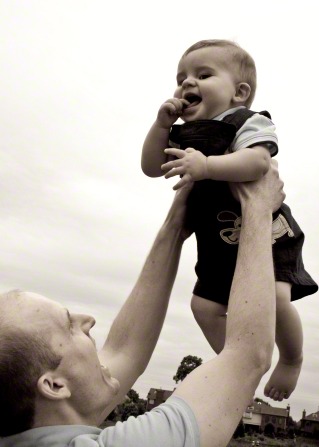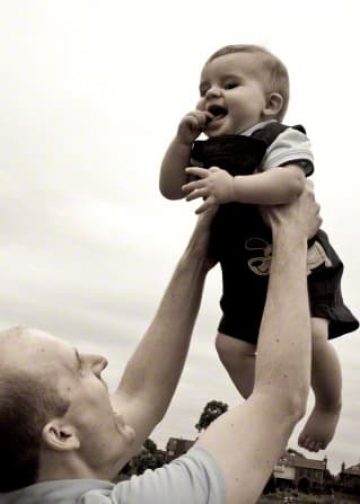by April
(April is a health educator and mother of three young children.)
 “Would it hurt the kids if I went to work full-time? Do they need me at home? Should I wait until they are older? Would I miss them too much if I went to work everyday?” I’ve heard these words so many times, but this time it sounded different because the voice was lower. This was my husband speaking.
“Would it hurt the kids if I went to work full-time? Do they need me at home? Should I wait until they are older? Would I miss them too much if I went to work everyday?” I’ve heard these words so many times, but this time it sounded different because the voice was lower. This was my husband speaking.
Women fret over this issue all the time. Most men don’t. My husband isn’t most men.
When my oldest daughter was born, I stopped working full-time so I could raise her. My husband did, too. For six years we have shared breadwinning and childrearing duties. The kids have their “Mommy days” (Mondays, Wednesdays, and Fridays) and their “Daddy Days” (Tuesdays and Thursdays).
The division hasn’t been perfectly equal. He’s better at breadwinning than I am, bringing in about two-thirds of our household income. However, while his wages are better, it’s my job that comes with the benefits. I work at one of those extremely rare part-time benefitted positions.
That fact has made our lifestyle possible. I think more families would like to try an arrangement like ours, but our healthcare system forces most families to depend on employer-sponsored insurance and most employers are unwilling to insure part-time employees. I hope that as healthcare reform is implemented families will have more flexible options.
Another barrier to this lifestyle is the limited roles men have placed on them by our society. Yes, I said men. As women’s rights have progressed, there are still conservative factions fighting to keep women at home, but most of society is moving towards a greater acceptance of letting women be whomever they want to be. Women might work full-time, part-time or devote all their time to their homes. Not all, but many people will applaud their decision. It seems that society at large still hasn’t considered offering such options to men. I struggle to think of male role models who have made any choice other than full-time employment in mainstream media, with the exception of movies like “Mr. Mom” which just make fun of men for their supposed incompetence at household duties.
I think that is sad, because our shared child-rearing experience has had many advantages. My children have tight bonds with both parents because we both have dedicated a large portion of our time to being with them. They are also unusually flexible, adaptive and open to new experiences. Maybe that’s a natural personality trait, but I suspect that a lifetime (so far) of spending every other day with a person whose approach to daily activities is different than the person who was in charge the day before may be contributing to that. My husband can truly empathize with me about the less rewarding aspects of staying at home with the children (cleaning, potty-training, searching for missing shoes, etc.) because he also devotes much of his time to these tasks. Every other day, we both get the opportunity to leave housework aside and pursue our other interests.
As much as we have liked both working part-time, it may be coming to an end now. Work has been getting busier for my husband, and his employer is considering changing his position to full-time. My husband has been looking at other part-time options, but in this economy, these other options could be riskier than staying where he is.
Regardless of what happens with his career now, he will always be a wonderful dad. I am grateful for his bravery in spending the last six years on a road less traveled (at least, less traveled by people of his own gender). Even if he does go back to the traditional fatherly role of full-time work, I know he will never become one of those dads who doesn’t know the name of his daughter’s kindergarten teacher or where his wife keeps the cleanser. Love you, honey. Happy Father’s Day.






14 Responses
Great post and very timely as it’s something I’ve been thinking about a lot. I’m so glad you had such a great arrangement for your family for so long. I don’t have kids yet but my husband and I are talking about someday in the future him being the stay-at-home parent, as I am in grad school right now and so might have better job prospects. It’s a new path and one that yes, isn’t really accepted by society yet. I’m so glad my husband is brave enough to try it out with me sometime. I’m also reading a book on this topic called The Daddy Shift: How Stay-at-Home Dads, Breadwinning Moms, and Shared Parenting AreTransforming the American Family. Pretty good read so far.
April, thanks for this post. Your arrangement is exactly what I would like to see more families exploring — a true sharing of both bread-winning and parenting. I myself would love to explore something like that, but as you mentioned in your post, benefits don’t often come with part time work, and my husband is in a career where it would be impossible to opt for part time.
I sure do love reading about the way you and your husband have made it work, though. And the way your husband is so concerned about a healthy work/parenting balance — sounds like a great guy and a great relationship.
I love this post, and hearing that I’m not a total loner in this sort of arrangement. For the first time in the course of our marriage and our childrens’ lives, my husband is working full-time. We’ve been discussing a lot of the questions you bring up in this post – it’s nice to know we’re not alone in the wondering.
Wouldn’t it be great if all dads could be so involved in the lives of their children? I have to admit, there’s a small part of me that mourns just a little for any future children we’ll have….like you say, I know that my husband is still a good dad no matter the career situation, but I do wish that we had the luxury of him spending the same sort of time with future children as he has with the two we have now. Sigh.
We found out yesterday that the best part-time option my husband had explored is not going to pan out and so he is committing to full-time with his present company today. We are about to make that same transition you recently did and last night my husband kept saying the same thing–he is most worried about our youngest child who has not had as much time with him as the other two. We are looking at flexible working hours and other options to keep him involved with the kids as we shift to this new schedule.
It’s really not that awful….we’ve found ways to make sure he still gets plenty of kids time (Saturdays, and me taking my long runs in the evening instead of the early morning so that I’ll butt out and not micromanage the evening time when he’s home – which I sometimes have a tendency to do). It’s not the same, but it’s still manageable.
I can only hope that I can have a job where the income is enough that husband can be home more when we have kids. He does in-home therapy with autistic children, and I’m not established in a “career” yet, so for right now the plan is probably to let his income support us if/when we have kids.
But in the long run, I think we both agree that parenting is an equal enterprise, and that he deserves to have as much of a relationship and as much time with our children as I do.
April, you are blessed to have such a great “Mr. Mom” for a husband and pioneering a road less traveled for the modern family. My husband has been out of work for the last two years so we too have taken a role reversal. I went from a part time job to full time to pay the bills, he stayed home to watch the kids. This post really spoke to me and what it takes to make this sort of arrangement work. Glad to know we’re not the only ones out there.
April,
You and your husband are very fortunate.
My husband and I were raised at a time of more rigid gender roles than the present. I had a hard time relinquishing autonomy with the kids and housework, even when my husband wanted to help. When I returned to fulltime work, he had to leave before me and come home after me–even though his job didn’t require that. He just couldn’t see me driving off to work while he was at home.
Times are better now!
I love this post! Thank you April. My husband and I also do co-parenting or equally shared parenting/providing. There is nothing that makes me happier! Obviously there are a lot of adjustments and arrangements, but I think kids and fathers are missing out in traditional arrangements. There is so much good that comes from larger fatherhood responsibilities and competency. If motherhood really is the greatest thing anyone can do, why aren’t they fighting for the chance?
I participated in The Mormon Women’s Roundtable at Patheos.com podcast about this subject this month. Obviously there are a lot of things that need to be worked out. One of the biggest things I see in families trying to work out equal parenting is NOT that men don’t want to help, but that women won’t let them do things THEIR way. Again, its something that men have to fight for. Maybe the 5th wave of feminism will be a men’s movement in the home!
Plus, I feel like a better mother with a couple days a week to focus on other things. It makes me so grateful and present for my days home. I look forward to it and adore it. I have been a SAHM during other transitions in our marriage and I didn’t have the same passion and excitement as I do when I switch days. I am forever grateful that as my kid grows she will get to know the super-active-fun-excited-to-be -here mom, not the depressed- sweats wearing- tv watching one.
I know everyone’s experiences are different and that this is a touchy subject, but co-parenting/providing has brought my family and I so much joy and happiness. I’m so glad you feel the same way and that we can talk about this stuff on-line. (I always feel like I have to talk around my own thoughts and life arrangements in my super-conservative ward).
I understand about feeling like you have to mind your mouth at church. I was in a ward once where I took a 12-week marriage/family sunday school class. On the first day, the couple teaching the class made a speech about how “liberal” comments about “adapting roles” would “detract from the Spirit” so such comments were explicitly forbidden. However, class members were more than welcome to make comments that were even more conservative than the text. My husband and I spent 12 Sundays biting our tongues and then going home to vent about the lesson on 1950s social culture we had endured at church that day. (By the way, the couple teaching the class was young–their life experience did not come from the 50s, just their ideas.)
When I was younger, we had the same arraignment at my house before my dad was able to get his career going. My sister and I consequently have a much closer relationship with my father than any of our brothers do, simply because only Mom was home when they were growing up while Dad was forging his way into the work force. The current situation works much better for the my family, but I do wish my brothers would spend more time with our dad.
I love this post. I’ve been reading about situations like this in theory, and it’s awesome to hear that it can work in practice.
I agree that men are often at a disadvantage, since part time work is less available to them, plus the critiques they get for staying home with kids. I admire the fact that you and your husband for making this work.
There’s a great book that deals with the subjects you’ve addressed, like division of labor, part-time work, benefits, etc. called Unbending Gender by Joan Williams.
Our family also has this arrangement. It has been wonderful and I would never go back to just one parent at home or at work. It is awkward sometimes for my husband to be the only man at play dates and to have little kids with him at scouts. In our ward it is expected that the moms will bring their kids to activities but dads will come child free. My husband is always called to help members during the day because he has a “cush job”, actual quote. He gets annoyed, but not enough to alter the arrangement.
[…] However, the lack of accommodations for working, American mothers reflects a still pervasive attitude: if a woman really wants to raise a family, especially a large family, she probably shouldn’t be in the workforce. It does not occur to many Americans that a father and mother can share child-rearing duties, like my husband and I do. […]